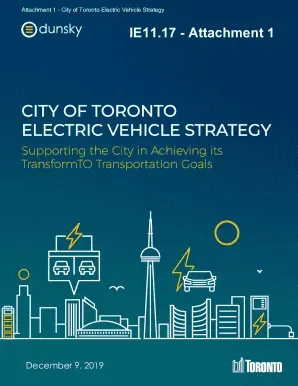The Toronto Electric Vehicle Policy is at the forefront of the city’s efforts to transition to greener transportation solutions. Recently, Mayor Olivia Chow ignited discussions by proposing to exclude Tesla vehicles from the city’s Zero Emissions Grant program, a move that has raised eyebrows amid ongoing Canada-U.S. tariffs affecting the automotive industry. This policy aims to encourage taxi drivers and ride-sharing operators to choose electric vehicles that align with Toronto’s decarbonization goals, while also addressing concerns about Tesla’s rising prices in Canada. Chow’s decision, announced during a budget meeting, reflects her belief that there are better alternatives for drivers than the popular Tesla brand. As the city prepares for this significant shift, the implications for Toronto taxi drivers and the broader EV market in Canada will be closely watched.
In light of the recent developments regarding electric vehicles in Toronto, the city’s regulatory framework is shifting towards sustainability and reduced emissions. The policy shifts aim to phase out traditional gasoline-powered taxis in favor of environmentally friendly options, aligning with global trends in urban transportation. With the introduction of the Zero Emissions Grant program, the city incentivizes drivers to make the switch, fostering a greener future. However, with the exclusion of Tesla vehicles from these incentives, discussions around electric vehicle accessibility for taxi operators have become more pronounced. This dynamic illustrates the challenges faced by city officials as they navigate economic pressures such as tariffs and the rising costs associated with electric vehicle ownership.
Impact of Mayor Olivia Chow’s Decision on Tesla
Toronto Mayor Olivia Chow’s recent decision to exclude Tesla from the city’s Zero Emissions Grant program has stirred significant discussion among electric vehicle enthusiasts and taxi drivers alike. This move is perceived as a strategic response to the ongoing Canada-U.S. tariffs and aims to shift the focus towards supporting other electric vehicle brands. By prohibiting Tesla from receiving subsidies, Chow is encouraging taxi drivers to consider alternatives that may not only be more affordable but also support the local economy. The decision reflects a broader trend in urban policy aimed at reducing emissions while navigating complex international trade issues.
The implications of this decision extend beyond just financial incentives; they signal a shift in Toronto’s electric vehicle policy. As Chow stated, “Tesla is a very popular brand,” yet her administration believes that no subsidies should be provided for such a well-established company. This could pave the way for a more diverse electric vehicle market within the city, potentially benefiting manufacturers and drivers of other brands. However, existing Tesla owners will not be affected, allowing them to continue enjoying the benefits of the program until they choose to renew their licenses.
Toronto Electric Vehicle Policy and Its Future
The Toronto Electric Vehicle Policy, particularly the Zero Emissions Grant program, is an essential component of the city’s effort to transition to sustainable transportation. This program is designed to phase out gasoline-powered taxis and promote electric vehicles among ride-sharing drivers. With the backdrop of Mayor Chow’s proposed motion against Tesla, the policy’s future may hinge on how effectively it can adapt to the changing dynamics of the electric vehicle market. The current focus on encouraging diverse brands could lead to a more competitive landscape, fostering innovation and potentially better pricing for consumers.
As the city moves forward, it will need to address the implications of rising Tesla pricing in Canada, which has already influenced the eligibility for federal rebates. The fluctuating costs of electric vehicles, compounded by potential tariffs from the U.S., could complicate the city’s decarbonization goals. Toronto’s approach to encouraging electric vehicle adoption will be critical in the coming years, especially as it navigates the complexities of international trade agreements and local economic considerations.
The Zero Emissions Grant, while a step in the right direction towards eco-friendly transportation, must be continually evaluated to ensure it meets the needs of all drivers without inadvertently favoring larger corporations like Tesla. The effectiveness of the policy will ultimately depend on its flexibility and responsiveness to market changes, ensuring that the goals of reducing emissions and promoting electric vehicle adoption remain at the forefront of Toronto’s transportation strategy.
Challenges in Implementing Electric Vehicle Policies
Implementing electric vehicle policies in Toronto, particularly against the backdrop of international tariffs and local market dynamics, presents several challenges. Mayor Olivia Chow’s decision to exclude Tesla from the Zero Emissions Grant program might be seen as a direct response to external pressures, such as the ongoing Canada-U.S. tariff discussions. This decision could be perceived as a way to shield local taxi drivers from potential price hikes associated with international trade disputes, thereby promoting a more stable environment for electric vehicle adoption.
Moreover, the rapid increase in Tesla pricing in Canada adds another layer of complexity to the situation. As prices rise, many drivers may find themselves unable to afford these vehicles, leading to a possible slowdown in the transition to electric alternatives. The city must carefully consider how its policies can effectively support drivers while navigating these price fluctuations and potential tariffs. By fostering a broader range of electric vehicle options, Toronto can help mitigate the risks associated with relying too heavily on a single manufacturer.
The Role of Tariffs in Electric Vehicle Adoption
The interplay between Canada-U.S. tariffs and electric vehicle adoption in Toronto is a critical concern for policymakers. As the federal government grapples with the potential economic impacts of tariffs on electric vehicle imports, local administrations like Mayor Chow’s are forced to make decisions that reflect these complexities. The exclusion of Tesla from the Zero Emissions Grant program may be seen as a preemptive measure to protect local interests and encourage drivers to consider more affordable options within the electric vehicle market.
In light of the tariffs, Toronto’s electric vehicle policy must be adaptable, ensuring that it can respond to sudden changes in pricing or availability of electric vehicles. By focusing on promoting a diverse range of brands, including those that may not be impacted by U.S. tariffs, the city can better position itself to achieve its long-term decarbonization goals. This strategic approach will allow Toronto to not only support local taxi drivers but also foster a robust electric vehicle ecosystem that thrives amidst global trade challenges.
Encouraging Electric Vehicle Alternatives
Mayor Olivia Chow’s stance on promoting alternatives to Tesla highlights a significant shift in Toronto’s approach to electric vehicle adoption. By encouraging taxi drivers to explore other electric vehicle options, the city aims to create a more inclusive environment for various manufacturers, potentially leading to lower prices and increased availability. This strategy aligns with broader goals of promoting sustainability and reducing greenhouse gas emissions, essential components of Toronto’s long-term transportation policy.
The focus on alternatives is particularly relevant given the rising costs associated with Tesla vehicles in Canada. As prices soar, many drivers may find it increasingly difficult to invest in Teslas, making it imperative for the city to support other electric vehicle brands. By doing so, Toronto can ensure that all taxi drivers have access to affordable and efficient transportation options, ultimately benefiting the environment and the local economy.
The Future of Ride-Sharing in Toronto
The landscape of ride-sharing in Toronto is poised for transformation as electric vehicle policies evolve. The decision by Mayor Chow to exclude Tesla from the Zero Emissions Grant program reflects a growing recognition of the need for diverse electric vehicle options in the ride-sharing sector. With the city’s goal to phase out gasoline-powered taxis, providing incentives for a variety of electric vehicles is essential for achieving sustainable transportation.
As the ride-sharing market adapts to these changes, drivers will need to be informed about their options. The Zero Emissions Grant program aims to make the transition smoother for those interested in electric vehicles, but it must also respond to the realities of rising vehicle costs and tariff implications. The future of ride-sharing in Toronto will depend on the city’s ability to create a supportive ecosystem that encourages the adoption of electric vehicles across different brands, ensuring that both drivers and passengers can benefit from cleaner, more efficient transportation.
Public Reaction to Electric Vehicle Policies
Public reaction to Mayor Olivia Chow’s decision regarding Tesla has been mixed, reflecting the complexities of electric vehicle adoption in Toronto. Many residents and taxi drivers support the initiative to diversify electric vehicle options, believing it could lead to more competitive pricing and greater accessibility. However, others express concern about the implications of excluding a popular brand like Tesla from financial incentives, fearing it may discourage some potential electric vehicle buyers.
The effectiveness of the city’s Zero Emissions Grant program will likely be scrutinized in light of these developments. As the public becomes increasingly aware of the environmental benefits of electric vehicles, the expectations for a robust and inclusive policy will grow. Engaging with the community and addressing their concerns will be vital for the city to foster trust and cooperation in achieving its climate goals.
The Economic Impact of Electric Vehicle Policies
The economic ramifications of electric vehicle policies in Toronto cannot be overlooked, particularly in the context of Mayor Olivia Chow’s recent decisions. By excluding Tesla from the Zero Emissions Grant program, the city is not only influencing consumer behavior but also shaping the local automotive market. This move could potentially stimulate competition among electric vehicle manufacturers, leading to better pricing and innovation, which is crucial for the city’s decarbonization efforts.
Moreover, as Toronto aims to phase out gasoline-powered vehicles, the economic landscape for taxi drivers will inevitably change. Those who embrace electric vehicles may benefit from reduced operating costs, while those who do not adapt may face financial challenges. The city’s approach to electric vehicle incentives will play a significant role in determining the economic viability of ride-sharing and taxi services moving forward.
Navigating Trade Disputes and Electric Vehicle Policies
Toronto’s electric vehicle policies are intricately linked to broader trade disputes between Canada and the U.S. Mayor Olivia Chow’s decision to restrict Tesla’s eligibility for the Zero Emissions Grant program may be seen as a strategic maneuver to mitigate the potential impacts of tariffs. As tensions between the neighboring countries persist, the city must navigate these challenges carefully to ensure that its electric vehicle initiatives remain effective and sustainable.
The ongoing discussions around tariffs and their implications for electric vehicle pricing underscore the need for a flexible policy framework. By promoting a diverse range of electric vehicles, Toronto can better insulate itself from the fluctuations in the market caused by external factors. This proactive approach will be essential for maintaining the momentum of electric vehicle adoption and supporting the city’s long-term environmental goals.
Frequently Asked Questions
What is the Toronto Electric Vehicle Policy regarding Tesla vehicles?
The Toronto Electric Vehicle Policy, as proposed by Mayor Olivia Chow, aims to exclude Tesla from the city’s Zero Emissions Grant program. This decision is part of a broader effort to phase out gasoline-powered vehicles in favor of electric ones over the next seven years. The exclusion of Tesla is set to take effect on March 1st, 2023, meaning taxi drivers who own Teslas will not qualify for licensing fee grants.
How does the Zero Emissions Grant Toronto impact taxi drivers using electric vehicles?
The Zero Emissions Grant Toronto is designed to incentivize taxi drivers and ride-sharing operators to purchase electric vehicles, phasing out gasoline alternatives. However, under the new proposal by Mayor Olivia Chow, Tesla vehicles will be excluded from this grant, which may affect those drivers who currently own or plan to buy Teslas.
What was the rationale behind Mayor Olivia Chow’s decision to exclude Tesla from the Zero Emissions Grant?
Mayor Olivia Chow’s decision to exclude Tesla from the Zero Emissions Grant appears to be influenced by the rising Canada-U.S. tariffs and the view that Tesla, being a popular brand, does not require additional subsidies. Chow has suggested that taxi drivers should consider purchasing other electric vehicles instead.
How do Canada-U.S. tariffs affect the Toronto Electric Vehicle Policy?
The Canada-U.S. tariffs have prompted Toronto’s government to reassess its Electric Vehicle Policy, particularly concerning Tesla. Mayor Olivia Chow’s proposed exclusion of Tesla from the Zero Emissions Grant could be seen as a response to these tariffs, which have implications for vehicle pricing and eligibility for government incentives.
What are the implications of the Tesla pricing changes in Canada for the Toronto Electric Vehicle Policy?
Tesla’s recent price increases in Canada have impacted its eligibility for federal EV rebates, which may further complicate its standing under the Toronto Electric Vehicle Policy. As Mayor Chow moves to exclude Tesla from the Zero Emissions Grant, these pricing strategies may deter taxi drivers from purchasing Teslas, aligning with the city’s goal of promoting other electric vehicle options.
Will existing Tesla owners in Toronto be affected by the new Electric Vehicle Policy changes?
No, existing Tesla owners operating within the current program will not be affected by the new changes to the Toronto Electric Vehicle Policy. The proposed exclusion from the Zero Emissions Grant only applies to new applications for licensing fees after March 1st, 2023.
What alternatives are suggested for Toronto taxi drivers instead of Tesla vehicles?
Mayor Olivia Chow has encouraged taxi drivers to consider other electric vehicle options instead of Tesla, as the city aims to promote a broader range of electric vehicles under the Zero Emissions Grant program, fostering a more diverse and competitive electric vehicle market in Toronto.
| Key Point | Details |
|---|---|
| Exclusion of Tesla from Grant Program | Toronto Mayor Olivia Chow announced plans to exclude Tesla from the city’s Zero Emissions Grant program. |
| Impact on Taxi Drivers | Taxi drivers with Teslas will not qualify for the licensing fee grant from March 1st, although current Tesla owners are not affected. |
| Decarbonization Plan Approval | In 2023, Toronto approved a plan to phase out gasoline-powered taxis and incentivize electric vehicle purchases. |
| Reactions to U.S. Tariffs | Chow’s actions could be a response to rising tariffs from the U.S., with other officials considering measures against Musk. |
| Tesla’s Price Increases | Tesla has raised vehicle prices in Canada, affecting eligibility for government rebates. |
| Alternative Plans | Chow mentioned that Toronto has alternative plans in place to respond to potential U.S. tariffs. |
Summary
The Toronto Electric Vehicle Policy aims to promote sustainable transportation by phasing out gasoline-powered vehicles and encouraging the adoption of electric alternatives. With Mayor Olivia Chow’s recent decision to exclude Tesla from the Zero Emissions Grant program, the city is taking a firm stance on its electric vehicle initiatives. This policy not only seeks to reduce emissions but also reflects the ongoing tensions related to U.S. tariffs and the economic implications of supporting popular brands like Tesla. By incentivizing a broader range of electric vehicle options, Toronto is fostering a more inclusive and environmentally friendly transport framework.








